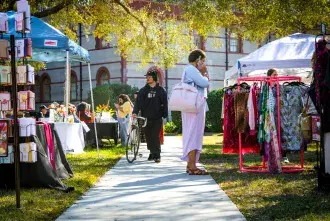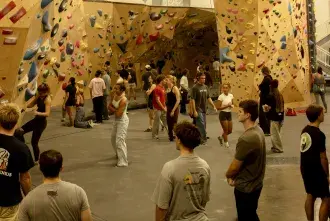In June, Pulitzer Reporting Fellow and recent Flagler alumna Olivia Lockett ’25 spent fifteen days in South Africa documenting the remarkable work of the all-female Anti-Poaching Unit and their Bush Babies Environmental Program. This experience left her feeling deeply inspired.
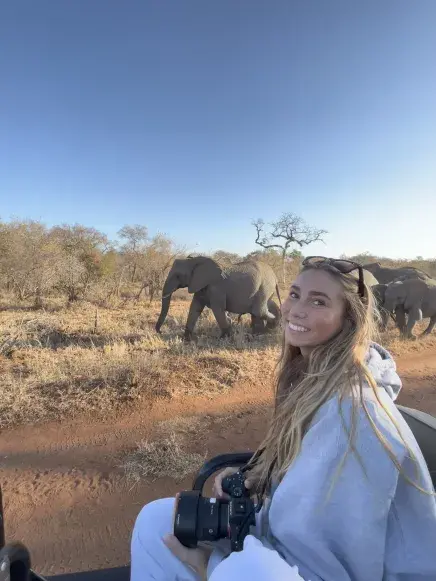
When Lockett learned she’d be traveling to South Africa, she was in complete shock. “I really didn’t think I was going to be chosen for it,” she said. “But once the shock settled in, I was just really excited and wanted to go right away.”
Initially, she hadn’t planned to take the “Global Issues and the Pulitzer Center” course, already balancing a heavy class schedule. But Dr. Chapman, Assistant Professor and Communication Department Chair, insisted it was the perfect fit for her final semester—and that she was meant to be there. “She told me, ‘There’s this class, it’s only one credit, you meet once a week, and you have to do it.’”
Lockett signed up. Months later, she found herself in South Africa as a Pulitzer Fellow, reporting in the wild among leopards, elephants, and giraffes.
Flagler College has been a participant in the Pulitzer Center’s Campus Consortium since 2017. The Pulitzer course offers students an opportunity to enhance their engagement with important world affairs, encouraging them to report on underreported challenges facing our world. The course was taught by Dr. Tracey Eaton, who retired at the end of the 2024 academic year and is now being taught by Professor Brian Thompson, who also serves as Flagler’s Director of Publications.

Each semester, one student is awarded a prestigious $3,000 reporting grant to produce their project as a Pulitzer Fellow, based on submitted proposals. Lockett’s passion for environmentalism and feminism inspired her search for a topic and ultimately secured her the grant.
She was thrilled to get to explore South Africa and encounter the incredible work of the Black Mambas up close, an All-Female Anti-Poaching Unit in South Africa, she’d become enamoured with but might not have ever discovered if it weren’t for the arduous task of finding an underreported subject to investigate.
“The hardest part about finding my topic was that it had to be underreported, because how do you find something that hasn’t been reported on yet?” Lockett said.
She typed in keywords to the Google search bar, such as “Environmental, female women activism, animals, endangered species”, and jumped to page five. Lockett knew she wanted to find a topic she was passionate about, so when she discovered the Black Mambas, she knew she’d found the perfect topic.
According to Helping Rhinos, a foundation dedicated to protecting Rhinos and a longtime supporter of the Black Mambas. This dedicated team of young African women patrols 20,000 hectares within South Africa’s Greater Kruger National Park, an area that supports the largest population of rhinos globally but also faces significant poaching threats.”
Lockett was especially interested in learning about the Black Mamba Bush Babies Environmental Education Program, which focuses on educating the local youth about wildlife conservation, focusing on growing vegetables and animal welfare, and also provides food for the children in the program, according to Transfrontier Africa.
Before learning she’d been selected as a Reporting Fellow, Lockett was already deeply invested in the Mambas—researching extensively and regularly communicating with them to learn all she could.
One of Lockett’s primary sources was Craig Spencer, who founded the Black Mambas in 2013. “Women are the single biggest untapped resource in Sub-Saharan Africa,” Spencer told Legends and Legacies—a sentiment Lockett strongly echoes in her reporting.
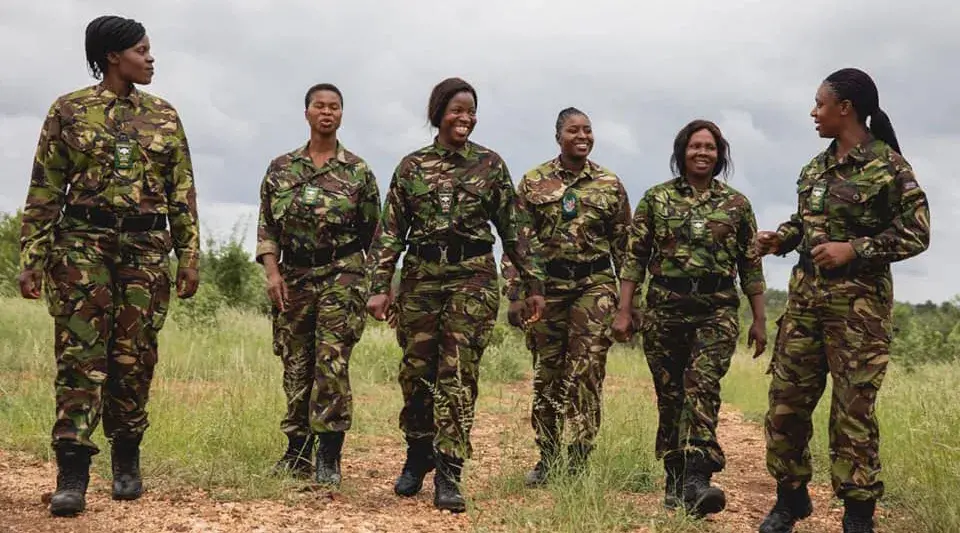
“I think they’re so bad*ss,” Lockett said. “They’re all women, and they don’t carry any weapons. It just shocked me. I was like, ‘How does this even work?’ And then looking into it more, seeing that they have the numbers, and that they are working better than other places that are carrying guns and are military trained, I was like, ‘This is awesome,’ because it proves something that I feel like a lot of women know deep down would work.”
According to the BBC, the Black Mambas’ approach is considered controversial because they do not carry weapons, relying instead on armed backup when confronting poachers. They are tracked in real time and operate their own control center.
Through her research and conversations with Spencer, Lockett learned these women are uniquely suited for the work. Spencer, an ex-veteran, began his anti-poaching efforts in the Western Cape, South Africa, after recognizing the threat to rhinos. His initial strategy, recruiting veterans and using a military approach, quickly escalated into an arms race with local communities, resulting in violence and instability.
“That’s when he realized something needed to change,” Lockett explained. Spencer turned to local women, believing they would avoid the ego-driven gun culture of some men in the area. Instead, these women would serve with pride, discipline, and a focus on protection rather than confrontation.
“They are stand-up women who come from their community and are elected by the heads of their community. I was just in awe of it all,” Lockett said.
While Lockett had read about the Mambas online, hearing Spencer’s firsthand account in South Africa and seeing the program still thriving left a deep impression. “It made me feel so pumped up and inspired more than anything,” she said.
Witnessing both the Mambas and the Bush Baby Center in person was, for Lockett, a truly surreal experience.
There were two versions of a typical day in South Africa for Lockett: the first, spent at the Bush Babies Environmental Center, and the second, out in the Bush.
“I would go to the Bush Babies Environmental Center, and I would stay there all day long. I would eat with the Mambas and the kids. They’re broken up into age groups, so following meals, I would bounce around to all their different lessons, take notes and photos, and just observe what was going on and bond with the kids. It was so much fun,” Lockett said.
Being out in the Bush was an experience like none other for Lockett. “In the mornings, I joined the Mambas for snare sweeps, walking through the bush to find snares left by poachers. At night, we’d go on patrol, driving to a central post in the reserve where we kept watch with flashlights for anything man-made that didn’t belong.”
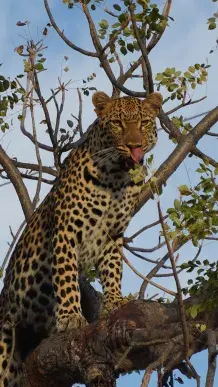
Lockett continued, “I had a lion one foot away from me, and they’re excited and they’re taking videos, but they’re not scared like I’m scared. It’s normal to them. I saw leopards. It’s like you’re driving out of the bush and suddenly two giraffes are standing in front of you, two feet away from the car.”
All throughout these amazing encounters, a constant for Lockett was getting to experience the Bush Babies discover the beauty of the wildlife on their doorstep. It was important for Lockett to have a broad understanding of them for her report.
As part of their programming, local children took a field trip into Kruger National Park, an experience that, for many of the children, marked their first visit despite living just 30 minutes from the entrance. The day was jam-packed with wildlife sightings and hands-on learning, offering a rare opportunity for students from a remote rural town with limited access to transportation or public spaces.
Lockett noted that most of the children didn’t speak English, and many had likely never interacted with someone like her before. At first shy, they quickly warmed up—giggling, playing, and even curiously touching her hair while she reviewed footage on her camera.
They would just come up once they got comfortable with me. I'd be sitting on my camera, looking at something or going back, seeing what I need to take more of, and I would just feel two little hands come up by me and take my hair. They got very silly and hyper.”
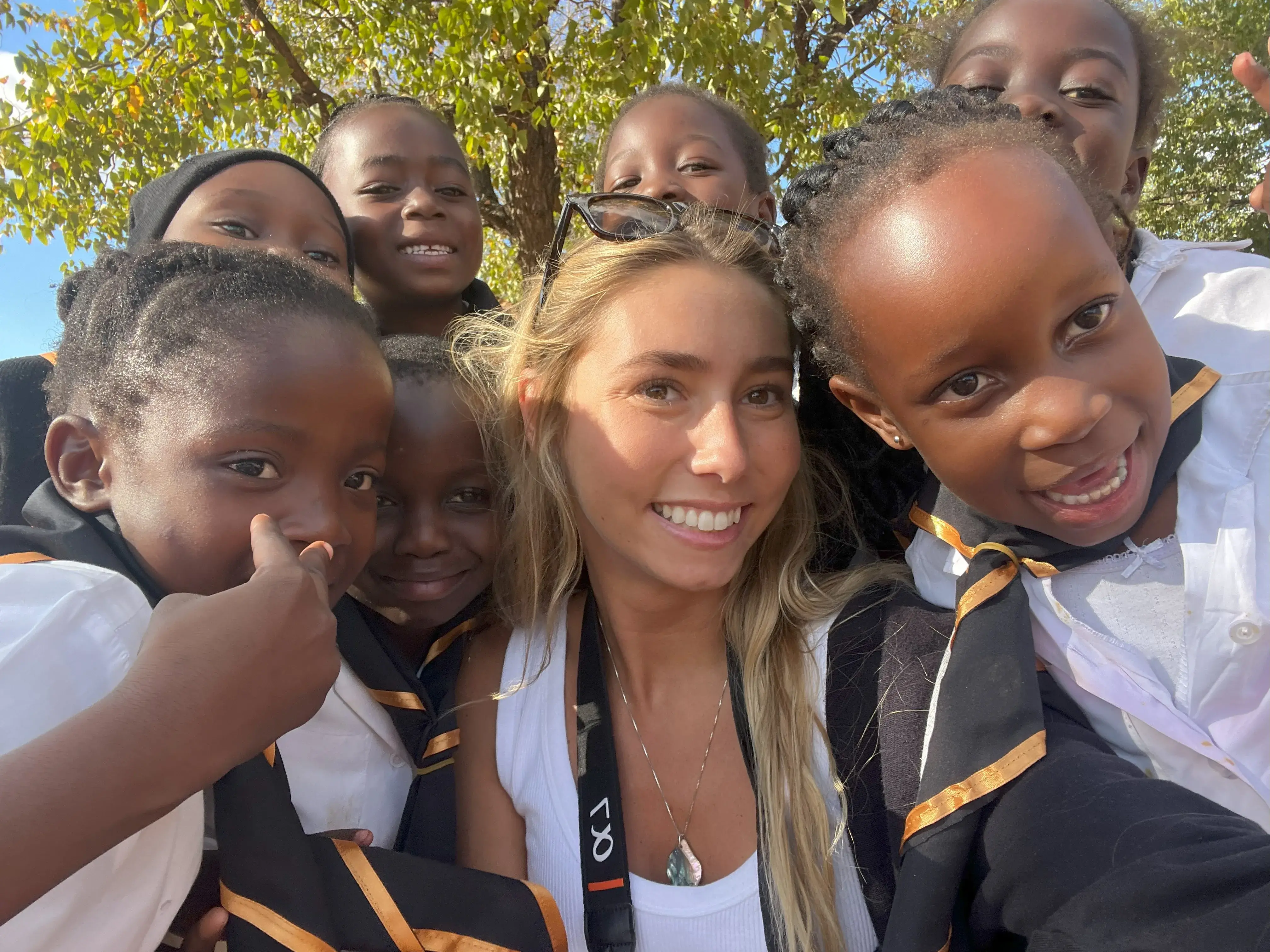
What stood out most to her was the older students’ passion for conservation. Known as “scouts,” these students participate in overnight trips into the bush, learning in-depth about their environment. Lockett described them as “little environmental warriors,” inspired by their knowledge and enthusiasm for protecting local wildlife.
Even weeks after her trip to South Africa, Lockett is still in awe of the passion of the people she met and the beauty of the wildlife she encountered. “Everyone that I met there taught me something new and inspired me in a different way,” she said.
